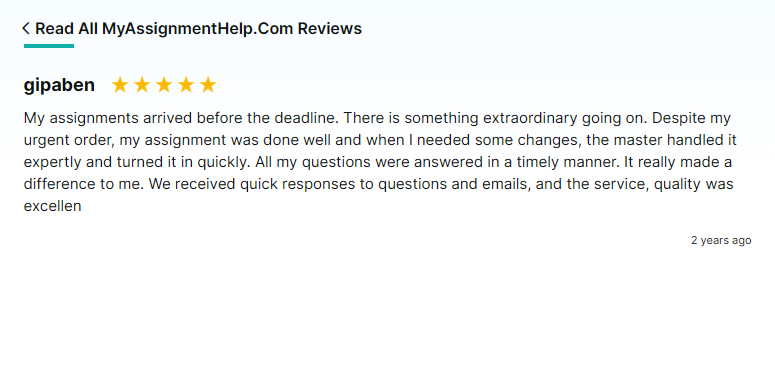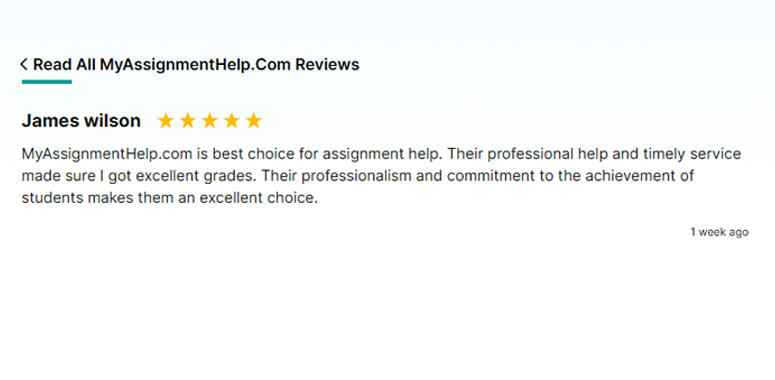Top Grades As A Result Of Best Assignment Writers’ Work
Students usually wonder, “I wish someone could write my assignment," when they are in desperate need of high grades. Fortunately, our professional writers have years of experience in academic writing and can whip up perfect assignments in no time. Whether you need help with a research paper or can’t figure out how to go about essay writing, the assignment expert assigned to your academic task will lend you a helping hand. Here are the multiple benefits you can expect when you hire writer services for expert help with assignment writing:
Unique Assignment Topic Choice
Hiring a professional assignment expert means you can write unique papers. Their experience allows them to view common topics from a unique perspective. Communicate directly with the experts and share your topic expectations with them.
Researched from Reliable Sources
Our online assignment helper has access to several reliable academic sources, such as journals and archives. That’s why you always get top-quality content.
Completely Error-Free Writing
You need not worry about the quality of your essay assignments anymore. Our online assignment help service guarantees zero errors because of their experience with creative writing tasks.
High-Standard Assignments Guaranteed
All homework assignments that we deliver, whether for school or university, are always up to the highest standards. We do not compromise in that regard.
Our company takes every measure possible to help students improve their knowledge and achieve academic excellence by connecting them with someone who is the perfect fit for their task. If you want, we can also provide free plagiarism guidance. So, you can expect good grades when you book our top-quality assignment writing services.
Get An A+
Affordable Assignment Help
Students looking for help with assignment writing in school, college, or university can't really splurge on such online writing services. That’s why our top-quality essay writing service doesn’t take unreasonable charges for custom essay writing or other assignment guidance services. Instead, we offer affordable paper writing services through the following means:
Registration Discounts
When you need assignment writing help and register your account on our website, you can unlock a registration bonus. Use this on your order for the first time to unlock unbelievably affordable prices.
Exciting Offers
Our year-round discounts help you fulfill all your academic needs and make your academic life easier without making you go broke. You’ll find a lot of exciting special offers on our website when you register for the first time.
Referral Bonuses
You can accumulate referral bonuses when you recommend our assignment experts to your friends and peers. When they need help with assignment papers and hire writer services for the first time, both you and your friend can get discounts on your tasks.
Dynamic Pricing
Our university assignment help online service offers dynamic pricing. In other words, you pay only for the services you choose. We review multiple factors to provide you with the best pricing so that you won’t have to worry about financial constraints when solving your writing needs.
The path to achieving academic success might be riddled with hurdles. Fortunately, our reasonable pricing means you don’t have to spend all your savings getting assignment help from expensive writing companies. We also offer a money-back guarantee to safeguard your interests.
Get A Quote
Will You Do My Assignment Right Now?
Whether you’re struggling to deliver assignments on time or need guidance with a particular subject, feel free to get the best assignment help online from us. Our assignment experts are available 24/7 to provide writing help in every subject, such as the following:
- Law
- English
- Chemistry
- Mathematics
- Psychology
- Philosophy
Here’s how you can book online homework help from us to solve your academic need:
Share Your Details
Providing clear instructions is the first step. Whether you need essay assignment guidance or dissertation writing assistance, all you have to do is share the task details with our essay writing service. Add details like the submission deadline, referencing and title page details, formatting style, task length, number of pages, etc. Our essay writers work around the clock to customize the perfect solution for you.
Make the Payment
Once our assignment writing service provider reviews your task details, we provide you with a tentative charge. This is the bare minimum we charge in order to compensate your assignment expert for the time they spend on research and writing the assignment while providing custom help.
Get the Solution
We have an excellent turnaround time. In other words, we always submit assignments before the deadline, even if you give us 3 hours to complete the task. You can stay up-to-date on the progress of your task by getting in touch with the expert writer yourself. Once the writing is complete, we’ll send you a notification. Log in to your account to access it.
Teachers at most universities seek high-quality assignments. Fortunately, when you seek writing help from us, we ensure that the assignments you submit exhibit in-depth knowledge on the topic. You can hire the same writer to offer well-written papers if you’re satisfied with the first order.
Will My Assignment Help Do My Assignments for All Genres?
MyAssignmentHelp is the #1 assignment service provider in the US that makes the learning process easier with high-quality assignments. The assignment writers use their excellent analytical skills to craft outstanding solutions that will leave all your professors impressed. Additionally, when you opt for our services to get high-quality help with assignment papers, you can look forward to assignment assistance in almost every assignment type, such as the following:
- Research papers
- Essays
- Case studies
- Dissertations
- PPT presentations
- Literature reviews
- Journal writing
- Opinion pieces
- Book reviews
- Lab reports
- Term papers
When you book an assignment online from us, we make sure that the experts write solutions that can improve your knowledge. Whether you’re a high school student or a college student, you can rest assured that we don’t repeat the same ideas again and again. Instead, our experts at MyAssignmentHelp try their best to present unique ideas to guarantee quality work. That’s why we are so highly recommended. They leave no stone unturned when searching for research gaps. That's why academic writing becomes easier when you hire our academic experts.
Even if you have poor time management skills, we’re there to lend you a helping hand. We understand that some papers take more time than others. That’s why, when you choose us for assignment help online, we promise that you won’t have to worry about time at all. Our expert writers’ excellent writing skills and in-depth knowledge of all topics allow them to complete all work in record time, whether they be term papers or any other paper tasks. They also provide free plagiarism avoidance tips and an originality report to guarantee the authenticity of the work. So, forget about encountering plagiarized content when you book us for immediate help.
Connect To Experts
How do Assignment Writing Service Prices Vary Among Different Providers?
There are multiple ways in which you can improve your assignment writing skills –
- Check high-quality sample papers to evaluate the writing style used by experts.
- Get one-on-one guidance from professionals to pinpoint major challenges.
No matter which option you choose, you need to find the best assignment writing service that is reliable. Low-cost websites that have just entered the market won’t have a good collection of samples on complex assignment topics. If they do, there’s a high chance that the content is AI-generated. Such samples are bound to contain lots of grammatical errors and factual inaccuracies. So, you won’t be able to learn anything of use by assessing those samples. Such new websites offering dirt-cheap prices also employ new assignment writers with barely any experience in academic writing. Therefore, they aren’t able to properly identify the challenges that a student can face or come up with an effective solution.
MyAssignmentHelp.com has 15 years of experience in this field. The samples that students access on the website (whether a case study or dissertation) are written by the academic experts themselves. They’re exceptionally well-written and very detailed. So, even if one doesn’t hire assignment writers from the website, just checking the samples will be enough for them to improve the quality of their work. Moreover, the website has experienced PhD writers who have been writing academic papers for decades. They can easily help identify students’ academic writing challenges and offer helpful suggestions to help them reach their academic goals and ensure they are completely satisfied.
Do You Follow the Format Style Specified When You Write My Assignment for Me?
Yes, any reputable and experienced assignment help website can provide formatting like the following –
MyAssignmentHelp.com even has its own referencing tool for students looking for referencing help on their website. These tools are available to everyone for free. It’s no wonder that students find us more approachable since they don't have to upgrade their accounts or pay additional fees just to generate citations. Instead, they can find the tools here –
Hire An Expert
Are the Reviews For Websites Offering Assignment Writing Help Authentic and Trustworthy?
In order to check for authenticity and trustworthiness of the reviews, one must look at the collective rating done by students rather than the one published by an assignment writing service or mentioned by a critic, as there are chances that the website is just promoting their own services by trying to paint other competitive websites as poor service providers. So, here’s what students can do –
- Look for recent reviews (any legit & good website offering custom assignment writing help will have updated reviews posted on their site highlighting why students highly recommend the service)
- Check the number of reviews (if the site claims that they have thousands of reviews by students, verify the information by checking the number of actual reviews in the review section; the higher, the better)
- Assess the language and content used by the reviewer (authentic and genuine reviews of students have a personal connection and talk about the pain they faced and solutions received, rather than running a critique and pointing out random points)
MyAssignmentHelp.com has over 40,000 genuine reviews from verified students. They also cover critical and negative reviews for their site.
Can I Check a Sample Before I hire Someone to Write My Assignment for me?
Any reliable website will always provide the opportunity for students to check sample solutions. Usually, these samples are readymade questions written by the experts on the website or previous solutions provided to other students. Since you aren’t hiring someone to write these samples, there’s no need to pay to access them. Now, some websites charge students a separate fee to provide full access to their sample database. But MyAssignmentHelp.com provides the assignment service for free.
You can always check multiple samples from a particular assignment writer on the website before you decide to hire an expert. By checking the samples, you can assess the following qualities of the expert –
- Researching capabilities
- Academic writing style
This custom assignment writing service always encourages students to check as many samples as possible before making a final decision. You can connect to customer support if you require additional options for samples so that you can pick the right expert.
Fill Out the Form













